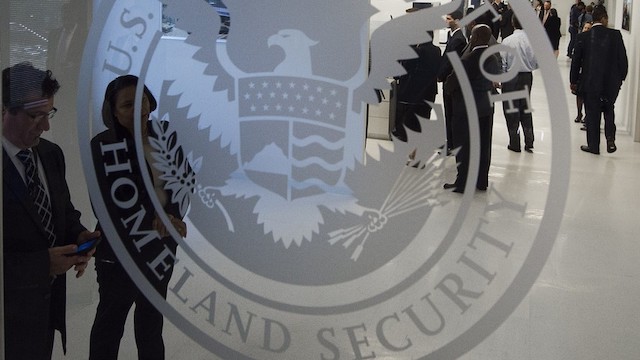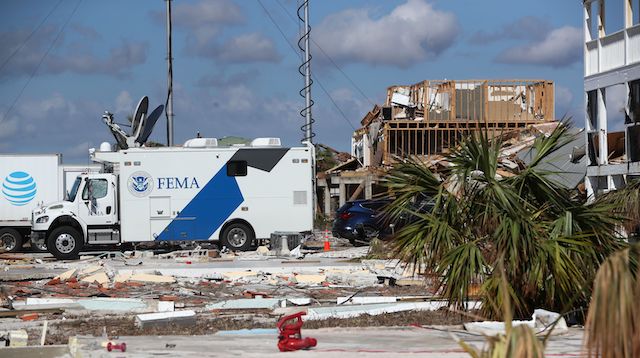
What is Homeland Security?
Homeland Security is an umbrella term that refers to American national security. The exact definition is “the national effort to ensure a homeland that is safe, secure, and resilient against terrorism and other hazards so that American interests, aspirations, and ways of life can thrive.” However, the official definition has changed a few times since 2002. The term didn’t exist in its current capacity in 2002.
The Homeland Security Act of 2002 was the first time it was ever used. The act established the United States Department of Homeland Security following the 9/11 terrorist attacks in 2001. While terrorist attacks are a homeland security matter, the term extends to cover all hazards, including both natural disasters and man-made events. It is different from homeland defense, though. Homeland defense refers to the military protection of our territory, sovereignty, citizens, and infrastructure.
The United States Department of Homeland Security outlines the following five goals in its mission statement:
- To prevent terrorism and enhance security.
- To secure and manage United States borders.
- To enforce and administer immigration law.
- To safeguard and secure cyberspace.
- To ensure resilience to disasters.
What is a Homeland Security Degree?

A homeland security degree is exactly what it sounds like but also so much more. There are hundreds of homeland security programs to choose from. You can also choose to earn a degree in a peripheral field like emergency management, public administration, cybersecurity, or criminal justice, to name a few.
These degrees can help you to qualify for a range of positions in the Department of Homeland Security, another federal agency, or even the private sector depending on your area of expertise. A homeland security degree is designed to equip you with the knowledge base and technical skills you need to identify threats to national security, perform investigations, manage communities in crisis, advocate for policies that protect America, and more.
Graduate level programs take that knowledge a step further and include courses in organizational leadership, management, professional development, and more. These additions to the curriculum further prepare you to become a leader in your area or hold an administrative position. Advanced homeland security degrees also allow you to dive deeper into a specific area that interests you. You could choose to focus on law enforcement, security analytics, public policy, emergency management, immigration, and more. By specializing your homeland security degree, you can open up even more career options for you and get an education that is perfectly tailored to your professional aspirations.
Homeland security degrees are offered at the associate’s, bachelor’s, master’s, and doctorate levels. At the undergraduate level, you can major specifically in homeland security; however, as you progress academically, there are fewer actual homeland security degree programs. At the graduate level, you are more likely to see a program like a Masters in Public Administration or a Masters in Criminal Justice with a focus in homeland security. That type of program will still give you more than adequate preparation for a homeland security career.
A sampling of courses you may encounter in a homeland security degree program includes Homeland Security and the Legal System, Public Health Evaluation of Disasters and Bioterrorism, Network Security and Cyberterrorism, International Security and Trade, Emergency Organizations and Management, Risk and Vulnerability Assessment, and more.
What Can You Do With a Homeland Security Degree?

The great thing about a homeland security degree is that homeland security is a very broad field. If you know that you want a career that promotes national defense but aren’t sure exactly what direction you’d like to go yet, this is a degree that will open many doors for you. Topics you’ll study as you’re earning your degree could include public policy, information systems, emergency response, psychology, and criminal justice. The knowledge you gain in your degree program can prepare you for a job working at a governmental agency, or even in the private sector at a security firm.
Since 2002, homeland security has been rapidly expanding as a field. The Department of Homeland Security is one of the largest departments in America’s system. You could get a job at an airport, an agency like FEMA, work as a criminal investigator, work in data security, you could even find a career in education.
A lot of agencies employ those who have homeland security degrees including:
- CDC
- Coast Guard
- Customs
- FBI
- FEMA
- TSA
Some common career options include law enforcement, emergency management, and information security. If you wanted to work in law enforcement, you could be a police officer, a border patrol agent, or a TSA agent. Emergency management professionals help communities prepare and respond to natural disasters like hurricanes, earthquakes, and fires, as well as man-made disasters like a terrorist attack. Information security is one of the most rapidly growing areas in homeland security. You would be tasked with protecting valuable information and the computer systems it’s stored in. Agencies like the FBI, CIA, and several others employ people for this purpose. There are also plenty of jobs in the private sector in information security.
What Jobs Can I Get With a Homeland Security Degree?

As you read above, homeland security is a broad field. That means that there are a lot of different career options for you if you’ve earned a homeland security degree. As always, the more advanced your education is, the more career opportunities you will have in the field.
Here are five of the more common jobs you can get with a homeland security degree. These jobs are geared towards those with an undergraduate education and tend to be entry level.
- Security Officer: This includes security guards for governmental agencies, courthouses, and more. This also includes gaming surveillance officers. If you were to choose this career, your responsibilities would include patrolling and protecting property against theft, vandalism, and other illegal activity.
- Emergency Medical Technician: Emergency medical technicians and paramedics are first responders that care for sick or injured patients in the event of an emergency. You would have the responsibility of responding to emergency calls, stabilizing patients, performing some medical services, and transporting patients to and from medical facilities.
- Police Officer: Police officers are another type of first responder. This could also include detectives and criminal investigators. Those with a homeland security degree are more likely to hold higher positions in law enforcement. Your responsibilities in this job would be to protect lives and property against illegal activity. This could include patrolling, making arrests, mediating situations, and more.
- Team Leader: A team leader is in charge of providing guidance, instruction, and leadership to a team, of course. You could see yourself as the leader of an emergency medical unit, a team of security officers, or a team of civil engineers in charge of disaster response. Consider this as similar to a management position in any other job.
- Instructor: As an instructor, you could train people on how to use weapons, how to respond to natural disaster or a terrorist attack, or how to monitor computer systems for cyberterrorism. You could work at a police academy, government agency, or even a school if you wanted to pursue this career.
Of course, with higher levels of education, you could see yourself working in a higher-level position. These are just starting points in the field of homeland security. Other job options include postal investigator, dispatcher, corrections officer, border patrol agent, and more.
What Can I Do With a Doctorate or PhD in Homeland Security?

Homeland security didn’t emerge as a field until 2002, making it relatively new in comparison to many other career fields you could choose from. The first graduate-level degree program in homeland security wasn’t established until 2003. To date, there are a little over 100 colleges and universities offering degrees at the masters level. That’s definitely a lot of schools but to put that in better perspective, there are over 5,000 colleges and universities across America. Unfortunately, there are even fewer options at the doctorate level.
There are no official PhDs in Homeland Security currently available in the country. You can earn a doctorate degree with an emphasis on homeland security, though. Some different choices you have are a PhD in Criminal Justice, a PhD in Public Policy and Administration, or a Doctor of Business Administration in Homeland Security. At that level, though, degree programs tend to be very easily tailored with electives, research, internships, and so on.
There are three common career paths with a doctorate in homeland security. First, there is the option to work as an executive or an administrator. This could be in a government agency, a private firm, etc. These positions require you to be able to solve complex problems and be a strong leader, so having your doctorate is perfect preparation.
Because the field is still growing, there is a very distinct need for educators. You could use your PhD or doctorate in homeland security to teach at the college or university level. You could also work in another organization as a trainer. When it comes to homeland security education, you could work as a program director, a professor, writing textbooks, creating and evaluating curriculum for programs, and more. Most universities require a PhD or doctorate degree in order to hold this type of position.
You could also use your doctorate or PhD in Homeland Security to be a researcher. There will always be a need for research in this field because the world is constantly evolving. There are new threats to consider, and there are catastrophic weather events every year. Research in this field is a critical piece of ensuring ongoing security and disaster-readiness in the nation. With a PhD, you will gain all of the technical skills in research and foundational understanding of homeland security that you need to be a part of it.
How Much Can You Make With a Homeland Security Degree?

Homeland security as a field encompasses a lot of different career options. There are also multiple degree levels you can choose from depending on the job that you want. Your level of education and specific career, along with several other factors, will play a role in determining what your salary may be when you enter the professional world. According to the Bureau of Labor Statistics, this is a stable career field to enter. It is growing steadily over the next decade, and some particular areas (like information security) are growing at a rate of more than three times the national average.
Another thing to consider when it comes to a homeland security job is that many of them come with amazing benefits. A lot of them are government jobs that include healthcare, insurance, a 401(K), personal leave, pension plans, and more. Some career positions may allow you to benefit from tuition reimbursement plans, health and wellness center access/programs, hazard pay, and even a uniform allowance. So when you consider how much money you can make with a homeland security degree, consider these benefits as well.
Your level of education is going to play a huge role in your future salary. Typically, the higher your level of education, the higher your salary. This is because you have the opportunity to fill more upper-level positions when you have more knowledge in the area. There is also always room for advancement in the field of homeland security through professional development, continuing education, and so on.
Here are some common homeland security careers and the average salary associated with the position.
- Transportation Security Officer: $28,900
- National Park Ranger: $42,000
- FBI Agent: $64,000
- Counterterrorism Analyst: $67,400
- Border Patrol Agent: $75,000
- Intergovernmental Affairs Specialist: $78,200
- Cybersecurity Analyst: $79,000
- Federal Air Marshal: $95,000
- Federal Law Enforcement Training Advisor/Instructor: $100,300
- United States Postal Inspector: $111,900
 The United States Department of Homeland Security is younger than you may think. Former President George Bush established the department in 2002 in the wake of the tragic terrorist attacks that took place on September 11th of the previous year. However, the department alone has employed roughly a quarter of a million people since then and the industry continues to grow. According to the Bureau of Labor Statistics, homeland security jobs have a healthy growth rate that falls in line with the current national average. Due to the current political climate in America, they could even grow at a rate faster than anticipated.
The United States Department of Homeland Security is younger than you may think. Former President George Bush established the department in 2002 in the wake of the tragic terrorist attacks that took place on September 11th of the previous year. However, the department alone has employed roughly a quarter of a million people since then and the industry continues to grow. According to the Bureau of Labor Statistics, homeland security jobs have a healthy growth rate that falls in line with the current national average. Due to the current political climate in America, they could even grow at a rate faster than anticipated.






